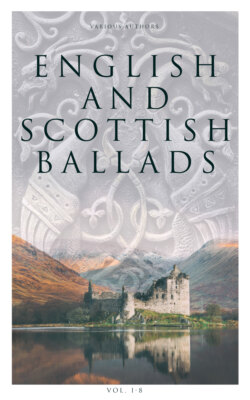Читать книгу English and Scottish Ballads (Vol. 1-8) - Various Authors - Страница 63
На сайте Литреса книга снята с продажи.
Minstrelsy of the Scottish Border, iii. 258.
ОглавлениеThat the repose of the dead is disturbed by the immoderate grief of those they have left behind them, is a belief which finds frequent expression in popular ballads. Obstinate sorrow rouses them from their grateful slumber; every tear that is shed for them wets their shroud; they can get no rest, and are compelled to revisit the world they would fain forget, to rebuke and forbid the mourning that destroys their peace.
"Ice-cold and bloody, a lead-weight of sorrow, falls on my breast each tear that you shed,"
says the ghost of Helgi in the Edda to his lamenting wife (Helgak. Hundingsb. II.) The same idea is found in the German ballad, Der Vorwirth, Erk's Liederhort, No. 46, 46 a, and in various tales, as Das Todtenhemdchen, (K.u.H. Märchen, No. 109, and note), etc. In like manner Sir Aage, in a well-known Danish ballad (Grundtvig, No. 90), and the corresponding Sorgens Magt, Svenska F.V., No. 6.
"Every time thou weepest for me,
Thy heart makest sad,
Then all within, my coffin stands full
Of clotted blood."
Rarely is the silence of the grave broken for purposes of consolation. Yet some cases there are, as in a Lithuanian ballad cited by Wackernagel, Altd. Blätter, i. 176, and a Spanish ballad noticed by Talvj, Versuch, p. 141. The present ballad seems to belong to the latter class rather than the former, but it is so imperfect that its true character cannot be determined.
Chambers maintains, we think erroneously, that this ballad is a fragment of The Clerk's Twa Sons o' Owsenford. See the second volume of this collection, page 63.
There lived a wife at Usher's Well,
And a wealthy wife was she,
She had three stout and stalwart sons,
And sent them o'er the sea.
5 They hadna been a week from her,
A week but barely ane,
When word came to the carline wife,
That her three sons were gane.
They hadna been a week from her,
10 A week but barely three,
When word came to the carline wife,
That her sons she'd never see.
"I wish the wind may never cease,
Nor fishes in the flood, 15 Till my three sons come hame to me, In earthly flesh and blood."—
It fell about the Martinmas,
When nights are lang and mirk,
The carline wife's three sons came hame,
20 And their hats were o' the birk.
It neither grew in syke nor ditch,
Nor yet in ony sheugh;
But at the gates o' Paradise,
That birk grew fair eneugh.
25 "Blow up the fire, my maidens!
Bring water from the well!
For a' my house shall feast this night,
Since my three sons are well."—
And she has made to them a bed,
30 She's made it large and wide;
And she's ta'en her mantle her about,
Sat down at the bed-side.
35 Up then crew the red red cock,
And up and crew the gray;
The eldest to the youngest said,
"'Tis time we were away."—
The cock he hadna craw'd but once,
40 And clapp'd his wings at a',
Whan the youngest to the eldest said,
"Brother, we must awa.—
"The cock doth craw, the day doth daw,
The channerin' worm doth chide;
45 Gin we be mist out o' our place,
A sair pain we maun bide.
"Fare ye weel, my mother dear!
Fareweel to barn and byre!
And fare ye weel, the bonny lass,
50 That kindles my mother's fire."
14. Should we not read, for fishes here, fashes—i.e. troubles?—Lockhart.
